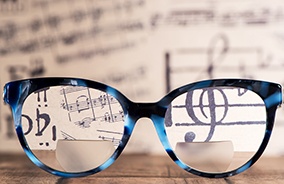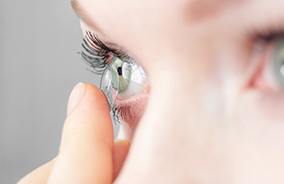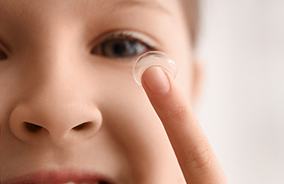

Nowadays, myopia – more commonly known as nearsightedness – is becoming an increasingly common condition among children and adults. The condition causes distant objects to appear blurry, and it can easily grow worse over time if it isn’t properly addressed. Fortunately, if Dr. Ajoian finds that you or your child has developed myopia, she can offer a customized management plan to slow down the condition’s progression and protect eye health in the long term. Call EyeSmile Dentistry and Optometry of Belmont today if you’re ready to explore your options for myopia treatment.

If you’re nearsighted, you’ll have a harder time reading objects like road signs and subtitles from across the room, but you’ll be able to see close-up objects like text in books and Facebook posts on the computer screen more clearly. Here are some other symptoms of myopia that you may experience:

Dr. Ajoian provides specialty myopia management options that can help control the progression of this condition so our patients won’t need stronger glasses over the years. We offer several different options to help provide the best results.

Progressive addition lens glasses, or PAL glasses for short, are designed to provide clear vision for near to far distances. Unlike regular glasses, they contain multiple prescriptions blended into a single lens; this can make them an excellent option for adults who don’t want to have to carry around multiple pairs of glasses for different vision tasks.

Specialty Ortho-k lenses can help slow the progression of childhood myopia to correct and control nearsightedness. After the lenses are worn while sleeping, your child should awake with corrected vision and see well without the help of glasses or contact lenses for the day.

Atropine eye drops have also been used to control myopia. This prescribed solution has been used for several years and has achieved effective short-term results.

MiSight® 1-day contact lenses don’t just correct your child’s blurry vision; they also slow down the progression of nearsightedness. The lenses focus light in a way that causes the eyes to slow their growth rate. This reduces the eyeball elongation that is the main cause of myopia.

Like MiSight® lenses, glasses with Stellest® lenses can slow down myopia progression by influencing the growth rate of the eyes. They have been shown to be an effective method for myopia management for children between the ages of 6 and 12.

The seventh leading cause of legal blindness in the United States population is degenerative myopia. It’s one of the most severe and rapidly progressing forms of myopia that is known to cause retinal thinning. Typically, patients with this condition notice decreased vision, headaches, and sensitivity to light. Although there is no current therapy to stop the retina from thinning, we do offer several solutions to restore your quality of life.
Myopia is the result of a lengthened eyeball or an overly curved cornea. This affects the way the eye receives light, causing it to bend and concentrate in front of the retina instead of directly on it. Heredity is generally one of the biggest risk factors when it comes to myopia; if your parents were nearsighted, then there’s a good chance that you’ll be nearsighted as well. The condition usually manifests during childhood, but sometimes it doesn’t develop until the adult years.
It varies from case to case, but generally, the answer depends on your age. For most people, myopia begins in childhood and grows worse during adolescence, but it stabilizes by early adulthood. This is because the eyes are still growing during childhood, but they’re completely developed by the time you reach the age of 20. As such, your vision generally won’t change much until you turn 40. It may appear to temporarily get worse due to changes on the surface of the cornea, such as dryness or an injury; treating these issues properly is key to making sure myopia doesn’t grow worse over time. If nearsightedness starts getting worse over the age of 60, it may be a sign that you have cataracts.
Myopia has been known to cause headaches and fatigue in people when they try to focus their eyes. Also, it generally worsens vision to the point where you won’t be able to drive safely without your glasses or contact lenses. The most dangerous aspect of myopia, however, is that it can put you at a higher risk for retinal detachment, cataracts, and glaucoma; all of these conditions can result in blindness if not treated. Call our office immediately if you notice worrisome symptoms.
Sometimes your child will let you know that they’re having trouble seeing things clearly. They might also develop a tendency to sit closer to screens or whiteboards so that they can see them properly. These are signs that you should set up an appointment at EyeSmile Dentistry and Optometry of Belmont so that we can perform an eye exam. This will allow us to confirm whether your child has myopia and, if they do, determine the type of treatment that can be used to correct it. It’s better to deal with potential vision problems early before they start to interfere with your little one’s academic performance.
Myopia shares some similarities with astigmatism, which is a condition that results in vision being blurry. The main difference is that myopia mainly affects your ability to see things from far away. Meanwhile, astigmatism can make things look blurry regardless of distance.
Astigmatism and myopia are caused by different defects in the shape of the eye. While myopia occurs when the eyeball is longer than normal or has a cornea that curves too much, astigmatism is the result of an irregularly shaped cornea or lens.
There is research that indicates that children who don’t spend enough time outdoors may be more likely to develop myopia. For this reason, if you’re concerned about your little one becoming nearsighted, you should make sure that they spend some time out of the house every day. Eye doctors typically recommend around 80 to 100 minutes of outdoor time for kids on a daily basis.
In the United States, myopia is a very common vision issue that is estimated to affect somewhere between 30% and 42% of the population. On a global scale, almost 30% of all people have myopia.
Even worse, some research has found that the condition is becoming more prevalent over time; the exact reasons for this change have yet to be confirmed, but one possible explanation is that it’s a consequence of spending more time in front of screens.
All parents need to be aware of the possibility of their children developing myopia and should keep an eye out for any potential warning signs so that the right measures can be taken as early as possible.
It depends on how severe your myopia is. The strength of the lenses in bifocal glasses is measured by diopters. If you are only mildly nearsighted, less than 3 diopters will typically be required. On the other hand, moderate nearsightedness usually calls for between 3 and 6 diopters. And if you’re severely nearsighted, then you might need more than 6 diopters. We’ll work with you to determine the right lens prescription for your case so that you can see clearly without issue.
Simply put, no; failing to wear glasses won’t result in your myopia growing worse. Any changes in your vision will continue to occur regardless of whether vision correction is used. However, it’s still better to wear glasses; if you don’t, you will be more likely to experience headaches and other unpleasant symptoms related to myopia on a regular basis. If you believe that you or someone in your family is in need of bifocal glasses, please call us right away.
I Need a Comprehensive Eye Exam I am Looking for Eyeglasses or Frames I am Interested in Designer Frames I am Interested in Contact Lenses I Need Therapeutic Contact Lenses I Have an Eye Emergency I Need Help with Dry Eye Management I Need Help with Eye Disease Management View Our Optometry Services View Our Dental Services